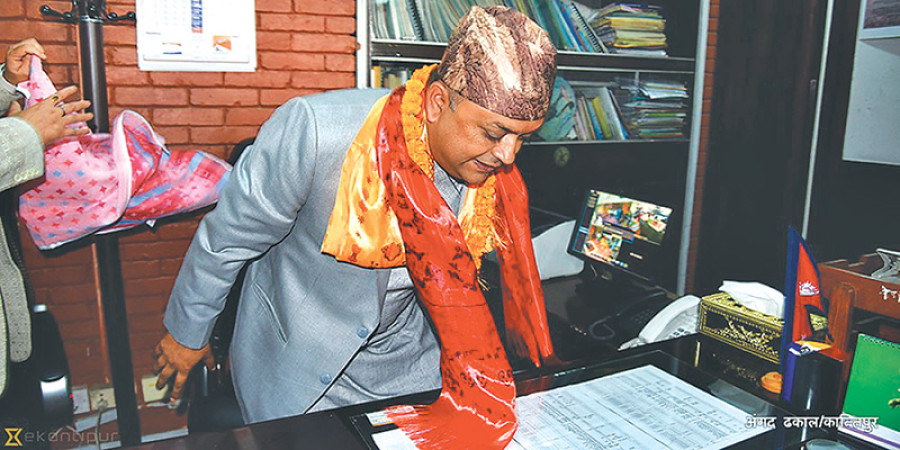Opinion
Talking is easy
The greatest challenge in the health sector is making services available nationwide
Kahar Singh Khadka
People have been asking what improvements have occurred in the health sector after the many initiatives launched by Health Minister Gagan Thapa. Some say that they are just populist political gestures. The reason behind this perception is that people are not much hopeful about the implementation part, which is yet to be seen. At the same time, Minister Thapa has become a champion in the eyes of the populace. He may have come up with ambitious health programmes, but one thing we must say honestly is that he has been trying his best to bring changes.
Thapa has done a praiseworthy job after assuming office by creating rules regarding the amount of financial assistance the government can provide to political leaders and cadres for medical treatment. The guideline has capped medical aid at Rs1.5 million. Let’s hope this ceiling will be strictly followed. The minister has also announced various health care facilities. A number of services have been made totally free of cost to all Nepali citizens. Provisions have been made to provide free treatment to certain groups of people who cannot afford expensive medical treatment.
Laudable initiative
Medical treatment like dialysis and valve transplantation for rheumatic heart patients have been made free for everybody. Now anyone can get free dialysis for life in the case of kidney failure. Likewise, kidney transplant will be done without charge if the patient’s nearest relative is the donor. The minister has also extended free valve transplant service to rheumatic heart patients of all ages. Earlier, this service was free only for those below the age of 15 years.
The Health Ministry has also introduced a provision allocating 10 percent of hospital beds to the poor, disabled, underprivileged and old citizens. They will also receive free medical treatment. Potential beneficiaries have to produce a recommendation letter from the concerned village or municipal council and the District Health Post to obtain this facility. However, getting this paperwork can be a lengthy process for poor and illiterate people. Due to such technical difficulties, there is little chance of getting this facility at the time of need. Therefore, it is important to analyse whether the target people have really benefitted from the free coverage.
Minister Thapa has also instructed hospitals to provide OPD services during office hours, provided allowances to doctors, made arrangements for the government to procure medicines itself, sent doctors to remote areas and signed partnerships with varied agencies. In addition to the Health Ministry, another government agency has come forward with a very commendable decision to support cancer patients. The Ministry of Women, Children and Social Welfare has decided to bear all treatment costs of women suffering from uterine or breast cancer. If the ministry follows up on its promise, it will be a great relief to women who are suffering from such diseases.
It is not possible to achieve great results in a short period of time in the health sector which involves the entire population. So we should not expect drastic changes in the nine months since Minister Thapa assumed office. But this does not mean that he can shirk his responsibility to reform the health system in the country. This does not mean that there are no immediate needs that need to be dealt with in the health sector. This means that he needs to focus on finding out the social determinants of health instead of concentrating on short-term goals.
Inequality in health care
Thapa is a responsible youth political leader. He stood by Dr Govinda KC during his campaign to end malpractices in the health sector. People expect much more from him because they think that things will turn out well under his leadership. So he has to present himself as a result-oriented leader who cares about the people’s concerns all the time. Has he been able to stand out from other ministers by showing good performance? Has he succeeded in bringing an outstanding plan for the betterment of public health?
If the truth be told, Thapa has not yet been able to address the concerns of people who lack access to health care services. Inequality in health care services prevails in the country. A large section of the population still has no access to basic health. There is a disparity between private and public health service providers in terms of service, quality and cost. So what has been really achieved so far? We need to find out a long-term solution to this problem.
Every year, the Health Ministry issues a strategic plan which is a long-standing tradition. And this year too, the health minister has unveiled a five-year plan entitled Nepal Health Sector Strategy Implementation Plan. After Thapa leaves office, the next health minister will repeat the same process next year. But just issuing health strategies is not enough; the targeted results can only be achieved by successful execution. The main problem we are facing is that there is a serious lack of implementation of the policies that are frequently issued. Giving an interview to a newspaper, Thapa said, “The first thing is political will, and I have that will.” Of course, your actions have shown that. But Minister Thapa, please keep one thing in mind, “Well done is better than well said.”
Khadka is chairperson of Prakriya Nepal, an NGO working in the field of health, education and consumer rights




 19.13°C Kathmandu
19.13°C Kathmandu










